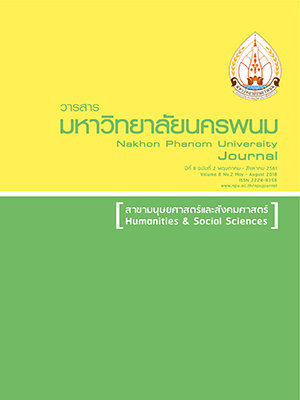บ้านภู : อัตลักษณ์ทางชาติพันธุ์ผู้ไทกับการบริหารการพัฒนาในบริบทการท่องเที่ยวเชิงวัฒนธรรมที่ยั่งยืน
Main Article Content
บทคัดย่อ
การวิจัยครั้งนี้มีวัตถุประสงค์เพื่อศึกษา 1) สภาพทั่วไปของชุมชนผู้ไททั้งในด้านภูมิศาสตร์ เศรษฐกิจ การเมือง สังคมวัฒนธรรม และอัตลักษณ์ทางชาติพันธุ์ผู้ไทบ้านภู 2) การจัดการท่องเที่ยวเชิงวัฒนธรรมโดยชุมชนของหมู่บ้านภู 3) รูปแบบอัตลักษณ์ทางชาติพันธุ์ผู้ไทกับบริหารการพัฒนาเพื่อนำไปสู่การเป็นหมู่บ้านท่องเที่ยวเชิงวัฒนธรรมบ้านภูที่ยั่งยืน โดยการสังเกตการณ์ทั้งแบบมีส่วนร่วมและไม่มีส่วนร่วม การสัมภาษณ์เชิงลึกผู้ให้ข้อมูลหลัก และการประชุมเชิงปฏิบัติการ กลุ่มผู้ให้ข้อมูลหลักคือ ผู้รู้ 10 คน ผู้ประกอบการท้องถิ่น 40 คน และผู้ให้ข้อมูลทั่วไป 25 คน นำข้อมูลที่ได้มาตรวจสอบความถูกต้องด้วยวิธีการแบบสามเส้า วิเคราะห์ข้อมูลตามความมุ่งหมายที่ตั้งไว้ และนำเสนอผลการวิจัยในรูปแบบพรรณนาวิเคราะห์ และการสังเคราะห์
ผลการวิจัยพบว่า 1) บ้านภู ตำบลบ้านเป้า อำเภอหนองสูง จังหวัดมุกดาหาร ตั้งอยู่ที่ราบสูงเนินเขา “หินเหล็กไฟ”ประกอบด้วย กลุ่มคนชาติพันธุ์ผู้ไทเป็นส่วนใหญ่ ชาวบ้านภูมีสำนึกในความเป็นอัตลักษณ์ทางชาติพันธุ์ผู้ไทอย่างชัดเจน ทั้งเรื่อง วิถีชีวิตชุมชน ภาษาผู้ไท เครื่องแต่งกายชุดผู้ไทสีน้ำเงินแดง อาหาร เรื่องราวประวัติศาสตร์ ฐานเรียนรู้ 6 ฐานตามหลักปรัชญาของเศรษฐกิจพอเพียง ลานวัฒนธรรมผู้ไท การฟ้อนผู้ไท และการผลิตสินค้าและบริการของชุมชน 2) ในด้านจัดการท่องเที่ยวเชิงวัฒนธรรม ชาวบ้านภูมีการปรับตัวโดยนำอัตลักษณ์ทางชาติพันธุ์ของตนเองเป็นจุดขายในการท่องเที่ยวเชิงวัฒนธรรมจากการจัดการตนเองผ่าน “การทำวัฒนธรรมให้เป็นสินค้า” หรือ “วัฒนธรรมเพื่อการท่องเที่ยว” และการจัดตั้งองค์กรและกระบวนการอัตลักษณ์ทางชาติพันธุ์ 3) รูปแบบอัตลักษณ์ทางชาติพันธุ์ผู้ไทกับการบริหารการพัฒนาในบริบทการท่องเที่ยวเชิงวัฒนธรรมที่ยั่งยืน ประกอบด้วย การจัดตั้งองค์กร การจัดทำยุทธศาสตร์สำนึกทางชาติพันธุ์ การนิยามความเป็นผู้ไท การสร้างและคัดเลือกสัญลักษณ์หมู่บ้าน การนำเสนออัตลักษณ์ทางชาติพันธุ์ในบริบทการท่องเที่ยว และการนำเสนออัตลักษณ์ทางชาติพันธุ์ภายใต้การมีปฏิสัมพันธ์กับนักท่องเที่ยว
Article Details
เอกสารอ้างอิง
บุญเลิศ จิตตั้งวัฒนา และเพ็ญศิริ ศรีคำภา. (2557). การพัฒนาการท่องเที่ยวแบบยั่งยืน. กรุงเทพฯ : เพรส แอนด์ ดีไซน์.
ประคอง จุลสอน. (2557). รูปแบบกระบวนการเรียนรู้อัตลักษณ์ชุมชน ผ่านเครือข่ายญ้อ ตำบลคลองขาม อำเภอยางตลาด จังหวัดกาฬสินธุ์. วิทยานิพนธ์ปริญญาดุษฎีบัณฑิต. มหาสารคาม : มหาวิทยาลัยราชภัฏมหาสารคาม.
ปานแพร เชาวน์ประยูร. (2555). ปาย : การสร้างอัตลักษณ์และการให้ความหมายเชิงสัญญะทางวัฒนธรรมเพื่อการท่องเที่ยว. วิทยานิพนธ์ปริญญาดุษฎีบัณฑิต. เชียงใหม่ : มหาวิทยาลัยแม่โจ้.
ปารณทัตต์ แสนวิเศษ. (2555). การมีส่วนร่วมของชุมชนในการจัดการศึกษาขั้นพื้นฐานของโรงเรียนประถมศึกษา: การสร้างทฤษฎีฐานราก. วิทยานิพนธ์ปริญญาดุษฎีบัณฑิต สาขาวิชาการบริหารและพัฒนาการศึกษา สกลนคร : มหาวิทยาลัยราชภัฏสกลนคร.
เยาวดี ด้วงกูล. (2555). การท่องเที่ยวเชิงวัฒนธรรม: การพัฒนาศักยภาพการท่องเที่ยวโดยการมีส่วนร่วมของชุมชน ภาคใต้ตอนบน. วิทยานิพนธ์ปริญญาดุษฎีบัณฑิต. มหาสารคาม : มหาวิทยาลัยราชภัฏมหาสารคาม.
วิรัช วิรัชนิภาวรรณ. (2555). การบริหารจัดการและการบริหารยุทธศาสตร์ของหน่วยงานของรัฐ. กรุงเทพฯ : ธนธัชการพิมพ์.
สุดแดน วิสุทธิลักษณ์ และคณะ. (2555). ต้นแบบการท่องเที่ยวเชิงสร้างสรรค์. คณะสังคมวิทยาและมานุษยวิทยา กรุงเทพฯ : มหาวิทยาลัยธรรมศาสตร์.
อรวรรณ บุญพัฒน์. (2557). การพัฒนารูปแบบการท่องเที่ยวเชิงวัฒนธรรมของจังหวัดเชียงราย. วิทยานิพนธ์ปริญญาดุษฎีบัณฑิต. ขอนแก่น : มหาวิทยาลัยขอนแก่น.


